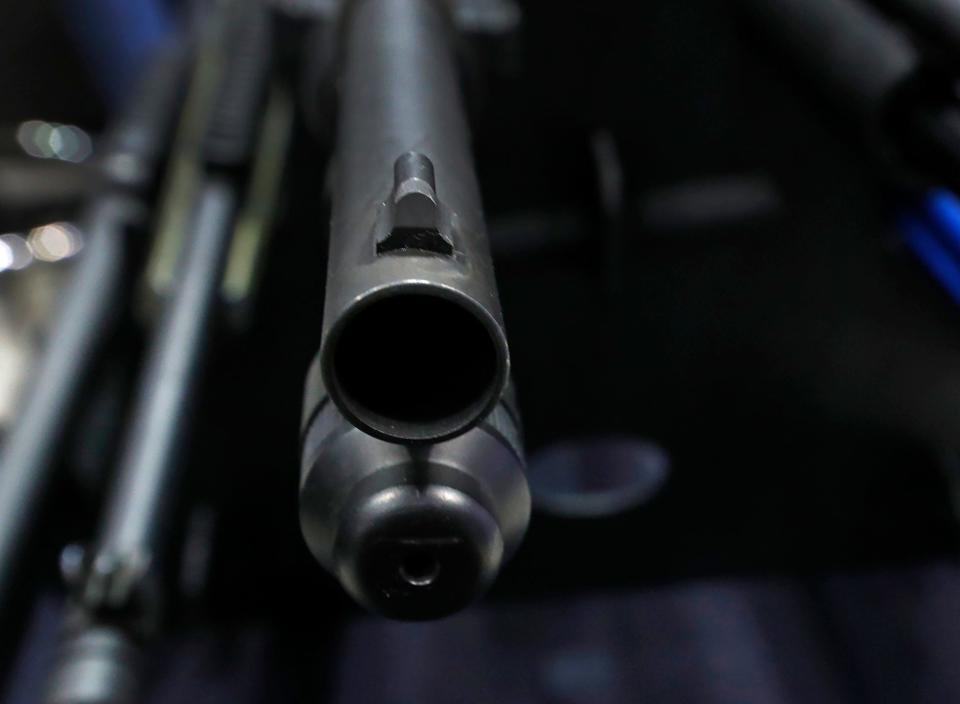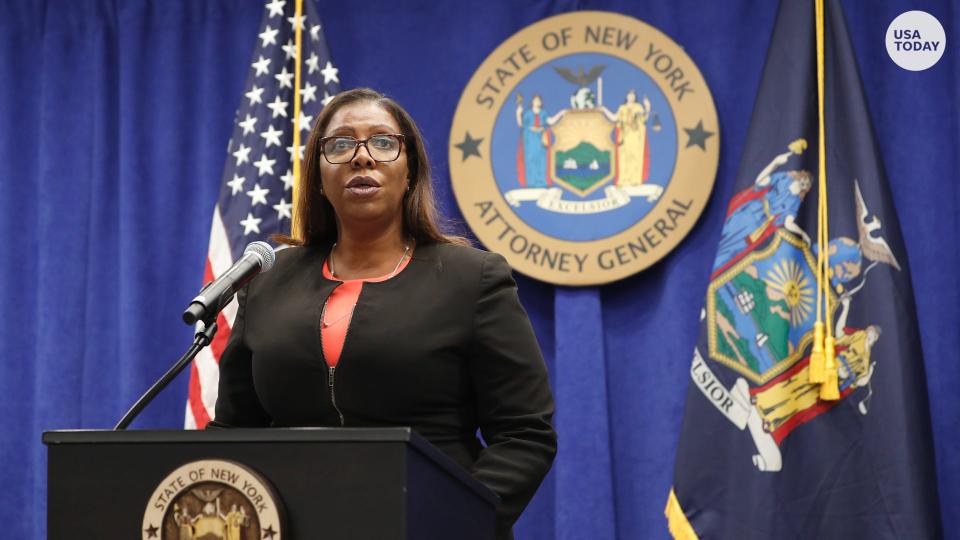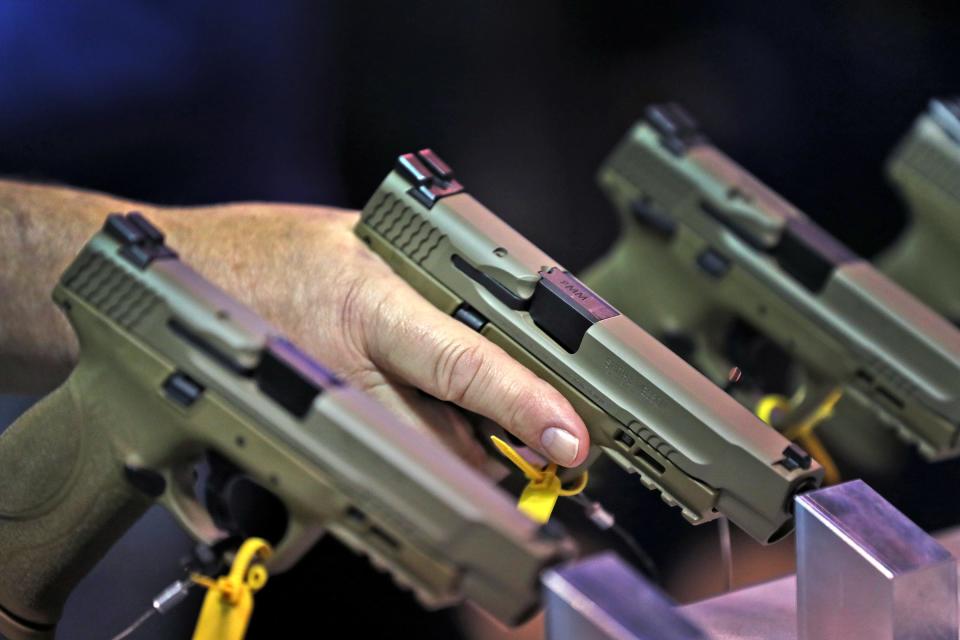What to know about the NY AG's attempt to take down the NRA
ALBANY – The National Rifle Association, the nation's most powerful gun rights organization, is in a battle for its very existence.
A lawsuit filed this week by New York Attorney General Letitia James seeks to formally dissolve the longstanding gun rights organization, alleging a wide array of corruption and fraud that helped the NRA diminish its assets by $64 million from 2015 through 2018.
The legal filing singled out longtime CEO Wayne LaPierre for allegedly using the organization to fund his lavish lifestyle, spending millions on private travel for him and his family, including eight trips to the Bahamas that sometimes included the use of a yacht with four staterooms, a jet boat and two jet skis.
If it's successful, the NRA would be forced to close and distribute its assets to other charitable outlets, including a valuable member list the organization says includes more than 5 million people. LaPierre and other leaders would be removed and barred from serving other New York-based charities.
The NRA, however, is not giving up without a fight.
The organization launched a counter suit Thursday alleging a political conspiracy, noting James, a Democrat, had labeled the organization a "criminal enterprise" before she ever took office and launched an investigation.
How will it all play out?
Here's the answer to some frequently asked questions about the battle over the NRA's future.
More: NRA, accused of wasting millions, faces shutdown attempt by NY attorney general
What is the NRA accused of?
A wide array of fraud, corruption and shoddy financial management that saw its leaders live lavish lifestyles at the expense of the organization.
James' 169-page lawsuit lays out a litany of law-breaking, much of it centered on LaPierre using the NRA's assets to benefit himself and his family. (Three other former and current NRA leaders — Joshua Powell, John Frazer and Wilson "Woody" Phillips — are also named in the suit.)
Among the highlights:
LaPierre is accused of spending millions of NRA dollars on private travel for him and his family, including numerous private flights that sometimes shepherded a niece and other extended family members without him on board.
He is also accused of making repeated trips to the Bahamas on the NRA or an NRA vendor's dime. Sometimes it was for a "celebrity retreat" in December; Other times, the NRA vendor granted him use of a 108-foot yacht named "Illusions" with a full crew, four staterooms and a 16-foot jet boat, which he never disclosed to the NRA.
LaPierre also secured a post-employment contract worth at least $17 million without NRA board approval, guaranteeing him lifetime compensation from the organization even if he's fired.
LaPierre and the NRA are also accused of hiding spending in a number of ways, including by having Ackerman McQueen — the NRA's longtime advertising firm — cover travel and entertainment expenses and billing the organization.
That allegedly fraudulent relationship allowed LaPierre to file false personal tax returns, according to the lawsuit.
More: ICE blocked from civil arrests at New York state courthouses, judge rules
What did the NRA do in response to the lawsuit?

The NRA filed a lawsuit of its own seeking to use James' own words against her.
In the NRA's legal filings, the organization pointed to a number of statements James made during her 2018 run for attorney general.
During her campaign, James was repeatedly critical of the organization, at one point referring to it as a "criminal enterprise" before she ever took office and launched an investigation.
"We need to again take on the NRA, which holds itself out as a charitable organization," James told Our Time Press in September 2018. "But, in fact, they are not. They are nothing more than a criminal enterprise."
The lawsuit claims James and Gov. Andrew Cuomo, both vocal supporters of gun-control measures and critics of the NRA, are attacking the organization for its political views, violating its First Amendment rights.
"The NYAG’s actions are an affront to democracy and freedom,” LaPierre said in a statement. “This is an unconstitutional, premeditated attack aiming to dismantle and destroy the NRA"
James said her lawsuit is not affected by her position on gun control and will continue on.
"The facts speak for themselves and our lawsuit will continue undeterred," she said.
More: Cuomo directs AG's Office to review actions during Brooklyn protests of George Floyd death
Why is this playing out in New York?

For that answer, we have to go all the way back to the 19th century.
The NRA's beginnings date back to 1871, when a pair of Union soldiers founded the association to promote marksmanship training. A year later, they opened the Creedmor Rifle Range in what is now Queens, according to the organization.
The NRA was granted a charter in New York in November 1871. It's been chartered in New York ever since.
That's what gave James her opening.
In New York, the Attorney General's Office oversees charities in New York. The NRA is a 501c4 charity headquartered in the state, so James is able to investigate and, if necessary, seek sanctions.
"The attorney general has significant power over New York's not-for-profit corporations," said Ted De Barbieri, an associate professor at Albany Law School. "It is entirely within her discretion and power to bring regulatory enforcement action."
Is there a precedent for this?
In 2018, then-Attorney General Barbara Underwood filed a lawsuit accusing the Donald J. Trump Foundation of mismanagement, accusing the president and his children of using the charity to illegally promote his presidential campaign.
The Trump Foundation ultimately agreed to a settlement that saw it dissolve and its assets redistributed to other charities.
It's not exactly an apples-to-apples comparison, however.
The NRA is a far larger and more powerful organization than the Trump Foundation. And the NRA's actions thus far do not suggest it is amenable to dissolving, as the Trump Foundation was.
Why isn't this in the criminal courts?
James lawsuit lays out conduct that could be interpreted as criminal — most notably the issues surrounding LaPierre's allegedly false tax returns.
But James would have to refer her findings to a district attorney or another prosecutor in order for a criminal prosecution.
Asked Thursday about the tax issues uncovered in the investigation, James said she would refer her findings to the IRS. She also said the investigation is "ongoing" and findings could be referred to the Manhattan district attorney in the future.
"If we uncover any criminal activity, we will refer it to the Manhattan district attorney," James said.
How long will the NRA's legal battle take?

The NRA's counter lawsuit suggests the organization intends to fight James' claims every step of the way, which could drag on the legal battle for quite some time.
It has the potential to stretch out for many months, if not years, within state Supreme Court in Manhattan.
"Absolutely," De Barbieri said of whether it will take a long time to settle.
"The complaint has serious allegations based on facts and investigations, and it seeks a remedy that is within the power of the Attorney General's Office ... because of the allegations of waste and abuse that are in the complaint."
President Trump said the NRA should move to Texas. Is that possible?

No, according to James.
New York not-for-profit corporations need certain state approvals before they can switch their state of incorporation.
With the NRA under an ongoing investigation and legal battle, it wouldn't be possible for it to just pick up and move.
"To be clear, no charity registered in New York state, including the NRA, can dissolve and relocate to another state without approval of my office or of the Supreme Court of New York," James said in a statement Friday.
"As long as our lawsuit continues, the NRA must stay right where it is and answer for their deep-rooted fraud."
Trump on Thursday said the NRA should move to Texas or some other state and live a "very good and beautiful life."
Jon Campbell is a New York state government reporter for the USA TODAY Network. He can be reached at JCAMPBELL1@Gannett.com or on Twitter at @JonCampbellGAN.
Support local journalism
We cover the stories from the New York State Capitol and across New York that matter most to you and your family. Please consider supporting our efforts with a subscription to the New York publication nearest you. Check out the latest offer.
This article originally appeared on New York State Team: NRA lawsuit: What to know about the NY AG's attempt to take down the NRA

